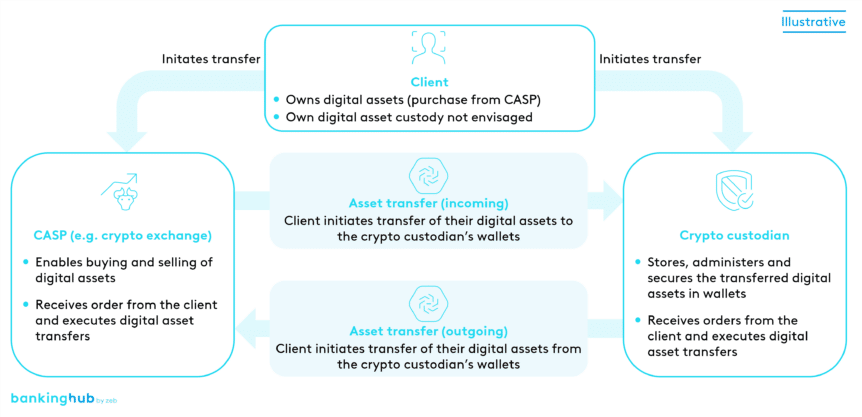Digital asset transfer between crypto-asset service provider (CASP) and crypto custodian
Transfer services on behalf of third parties include the transfer of digital assets in a distributed ledger network (DLT network) from one wallet address to another on behalf of natural persons or legal entities.
Financial institutions that offer transfer services on behalf of third parties initiate and monitor the transfer (specifically, the incoming and outgoing delivery) of digital assets from one digital asset wallet to another. In addition to being connected to the DLT network, the crypto-asset service provider (CASP) must also have control over or access to the respective digital asset wallets to be able to provide a transfer service.
The CASP receives an order to perform transfer services for third parties. This order is validated internally and, once approved, broadcast to the DLT network. The order is then validated by the DLT network. After successful validation, the digital assets are transferred to another wallet address. Custodians or wallet providers can also offer transfer services as part of Staking-as-a-Service by facilitating the transfer of custodied tokens to a smart contract on the blockchain. However, these services do not include validators, nodes, or miners involved in confirming and updating the distributed ledger (see Recital 93 MiCAR). Purely structural services are not covered.”
Unlike traditional securities or payment transactions, on-chain transfers of digital assets cannot be reversed once executed by the DLT network. Therefore, transfer service providers must implement risk mitigation measures to prevent manual errors during transfers, such as erroneous transactions caused by typos when entering wallet addresses.
What are the regulatory requirements?
Since 2021, transfer services on behalf of third parties have been regulated throughout Germany by the Crypto Asset Transfer Regulation (KryptoWTransferV). The Money Transfer Regulation has been in effect throughout Europe since 2017. Both regulations describe the implementation of the requirements of the Travel Rule, previously known as FATF Recommendation 16, as adapted to crypto assets by the Financial Action Task Force on Money Laundering (FATF). As a result, CASPs are not only required to provide client data for traceability purposes, but also to screen the counterparty and its service provider in accordance with market standards (AML, KYC).
As of 2025, transfer services on behalf of third parties will also be regulated by MiCAR (Market in Crypto-Assets Regulation) as services subject to licensing. MiCAR will impose specific disclosure requirements on crypto-asset transfers, covering the entire process from client on‑/offboarding to rejection of a transfer. The aim is to make the transaction as transparent as possible for the client, while reducing the risk of money laundering or terrorist financing. Under MiCAR, transfer services for clients in relation to e-money tokens (including fiat-referenced stablecoins) may only be provided by licensed payment institutions.
Related digital asset services according to MiCAR:











